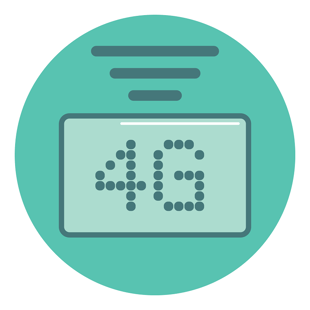
Imagine a scenario where you need to set up a team of 50 people in a new location where there are no phone lines, broadband or Internet, and you need to have this team up and running in 10 days’ time.
This could be an office move, a temporary project, or a construction company setting up on a new site.
This scenario would have been the stuff of nightmares just a few short years ago, Now, thanks to mobile Internet, it can be done – but for 50 people all working concurrently? That seems a stretch when so much bandwidth will be required. Can mobile Internet really deliver that kind of support?
What existing solutions are available?
Mobile Internet solutions utilise one or more SIM cards in a special router. That provides adequate and usable Internet access, usually across a VPN (encrypted tunnel) for a limited number of people. The bandwidth required depends primarily on the type of applications being used. CADD and other mainly visual tools consume a great deal of bandwidth for each concurrent active user.
Using multiple carrier SIMs with Load Balancing
Obviously, if the router has two SIM cards, each communicating with a different carrier (e.g. Vodafone, O2 etc.) then the risk of an outage is reduced. It also means that load balancing can be deployed to help ensure that one connection does not get overloaded while the other has spare capacity.
Does load balancing speed up my applications across the Internet?
No. It may speed up browser usage but not much else. When a user starts a session with an application, this is assigned to one of the SIMs and cannot use spare bandwidth on the other SIM or SIMs.
What is 4G Bonded Network from GPS Telecoms?
Bonding is different from load balancing. It requires a special device called a Hub in a data centre. That hub bonds the downstream data streams to and from the SIMs in the router, as well as the upstream channels to the carriers, into a single stream that has the sum of all available bandwidths from all the carriers.
Also the routers on the client site split each message into chunks called packets and send them across every available SIM channel. The Hub reassembles them back into the original message. That makes transmission much faster and delivers really fast Internet speeds for users.
Significantly, GPS Telecoms uses 6 SIMs in the router, each connected to a different mobile Internet service provider. This delivers unsurpassed speed and resilience.
Is the bonded solution secure for my company’s data going across the Internet?
Yes, on two counts. Firstly, all communications are sent across encrypted VPNs, which are a well-established and secure approach. Secondly, because messages are split into packets and sent across all of the available carrier channels, interception and reassembly is almost impossible.
What are the business benefits of 4G Bonded Network
- Users experience high speeds of up to 100 Mbps
- No latency when using the company’s business applications
- Highly secure communications channel to your company network
- Fast installation and a reusable solution that you can take with you to the next site
- Risk of downtime is minimised through a fusion of different technologies that results in 100% uptime by distributing failure risks
- The full bandwidth is always made available
- Connectivity to the company network is never lost, as long at least one link remains active
- Barely perceptible packet loss, if any - even in the most challenging environments
How can I get this mobile Internet solution from GPS Telecoms?
Contact us today and speak with one of our experienced telecoms engineers, or call us on 03330 093 677.





